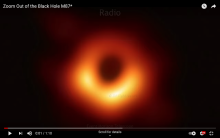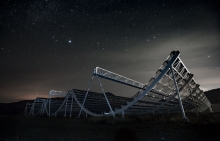The McGill Space Institute (MSI) and the Institute for Research on Exoplanets (iREx) at Université de Montréal are at the forefront of the exhilarating pace of space research, helping to advance our knowledge of extrasolar planets, fast radio bursts, the dark universe, and other extraterrestrial mysteries. Now their stellar work and efforts to recruit top students and researchers are getting a huge boost thanks to extraordinary gifts to McGill University and the Université de Montréal from the Trottier Family Foundation.


Astronomers at McGill University, MIT and elsewhere have detected a strange and persistent radio signal from a far-off galaxy, that appears to be flashing with surprising regularity. Classified as a fast radio burst, or FRB, this new signal persists for up to three seconds, about 1,000 times longer than the average FRB. Within this window, the team detected bursts of radio waves that repeat every 0.2 seconds in a clear periodic pattern.

In April 2019, scientists released the first image of a black hole in the galaxy M87 using the Event Horizon Telescope (EHT). However, that remarkable achievement was just the beginning of the science story to be told. McGill University astronomers were part of this global effort.
Data from 19 observatories are now being released that promise to give unparalleled insight into this black hole and the system it powers, and to improve tests of Einstein’s General Theory of Relativity.

NASA’s science rover Perseverance, the most advanced astrobiology laboratory ever sent to another world, streaked through the Martian atmosphere on Thursday, February 18 and landed safely on the floor of a vast crater, its first stop on a search for traces of ancient microbial life on the Red Planet. (National Post)
Here are some experts from McGill University that can provide comment on this issue:

A Canadian-led team of astronomers, including researchers from McGill University, has discovered that a repeating fast radio burst (FRB) originating from a nearby galaxy pulses at regular intervals.
Researchers within the Canadian Hydrogen Intensity Mapping Experiment (CHIME) Fast Radio Burst Collaboration used the CHIME telescope in British Columbia to show that the repeating radio source known as FRB 180916.J0158+65 – first discovered in 2018 by the same group - pulsates apparently every 16.35 days.

Two McGill University astronomers have assembled a “fingerprint” for Earth, which could be used to identify a planet beyond our Solar System capable of supporting life.
"There is definitely a difference between the sources, with some being more prolific than others," physicist Ziggy Pleunis of McGill University told Science Alert. "We already knew from FRB 121102 that the bursts can be very clustered: sometimes the source doesn't burst for hours and hours and then suddenly you get multiple bursts in a short amount of time. We have observed the same thing for FRB 180916.J0158+65, for which we report 10 bursts in this paper."

It’s been an exciting time for astronomy lovers in the past few years: the first black hole picture amazed, many exoplanets have been discovered, gravitational waves were observed for the first time.
Now, what will be the next big things in astronomy?
Astronomers from across Canada will gather in Montreal June 17-20 to discuss emerging topics that could lead to big new advances in the field in the coming decade.

McGill University astrophysicist Matt Dobbs is the recipient of the 2019 Killam Research Fellowship in Natural Sciences.
The announcement was made today by the Canada Council for the Arts, which revealed this year's winners of the prestigious Killam Program, composed of the Killam Prizes and the Killam Research Fellowships.

The Event Horizon Telescope (EHT) — a planet-scale array of eight ground-based radio telescopes forged through international collaboration — was designed to capture images of a black hole. Today, in coordinated press conferences across the globe, EHT researchers reveal that they have succeeded, unveiling the first direct visual evidence of a supermassive black hole and its shadow.

Cosmologist Jonathan Sievers and international-relations scholar Jennifer Welsh will become Canada 150 Research Chairs at McGill University. The appointments were among the 24 Chairs announced today at the Canadian Museum of History in Gatineau, Quebec, by Minister of Science Kirsty Duncan.
NASA says that the next full moon will be a ‘super blue blood moon’. What does it mean? Kelly Lepo, coordinator of the McGill Space Institute, is available to answer your questions. (NASA)
Kelly Lepo, Coordinator, McGill Space Institute
(514) 398-4471, Kelly.Lepo [at] mcgill.ca

The afterglow from the distant neutron-star merger detected last August has continued to brighten – much to the surprise of astrophysicists studying the aftermath of the massive collision that took place about 138 million light years away and sent gravitational waves rippling through the universe.
The Geminids meteor showers will peak on the evening of Dec. 13 and continue until early morning Dec. 14. The meteors will be bright and you can see up to 120 meteors an hour stream across the sky. Observers need to go to areas with little light pollution.
Dr. Kelly Lepo, McGill Space Institute
